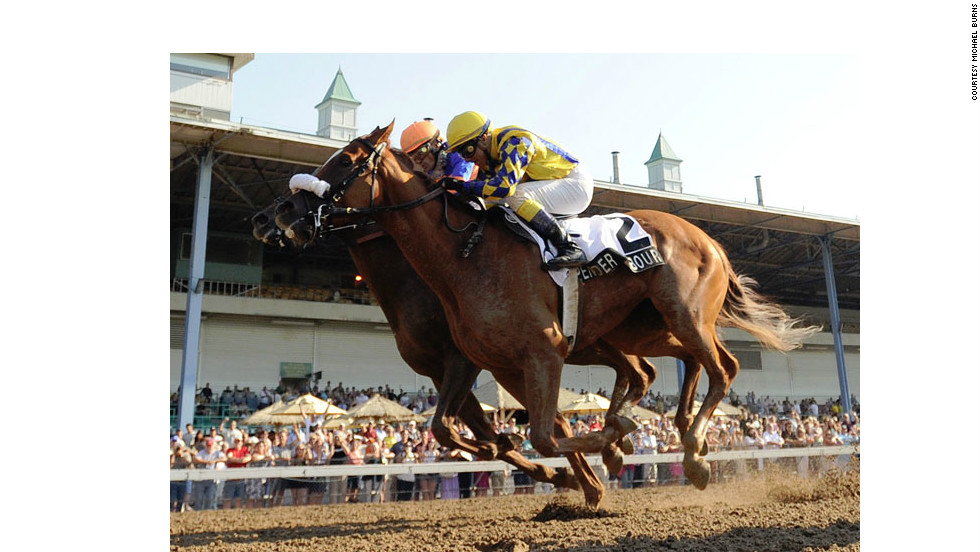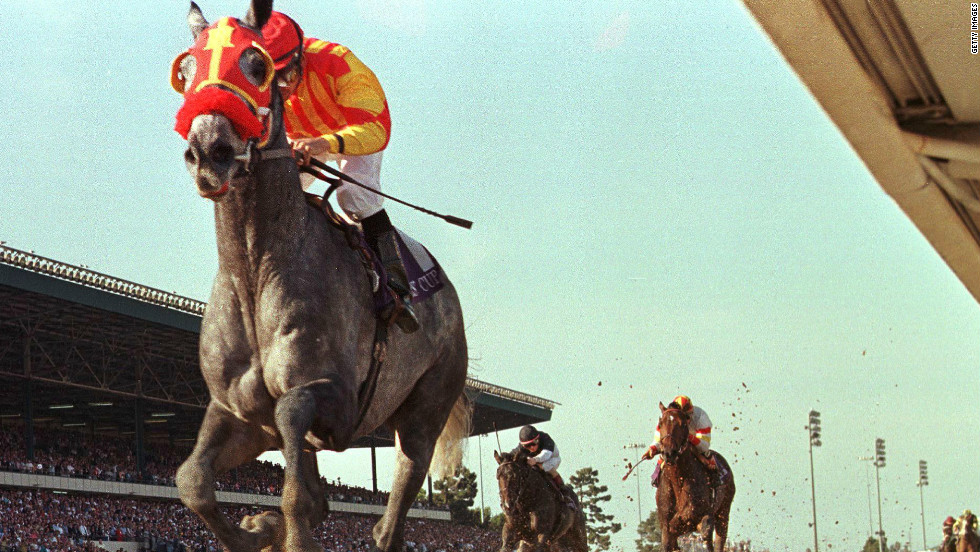Story highlights
- Half of Ontario's race tracks could close when government pulls funding scheme
- Feeling the pinch is 115-year-old Fort Erie Race Track in Ontario, Canada
- British racing starts finding new revenue sources to offset fall in betting money
- Future of horse racing may lie in marketing to family friendly audience
On a blazing summer's day in 1961, a race horse called Puss n Boots decided enough was enough and took an impromptu dip in a nearby lake. The only problem? He was racing at the Fort Erie Race Track at the time.
Jockey Ronnie Behrens was sent flying as the horse made a sharp detour for the scenic infield lake. Adding insult to injury, wilful Puss n Boots had been winning the race at the time.
The fabled plunge has gained almost legendary status in Canada, with Fort Erie now holding an annual Puss n Boots Stakes -- ending with a traditional leap into the lake by the winning jockey and trainer.
But as Canadian government funding cuts take their toll, it seems the jockeys are not the only ones trying to stay afloat.
The picturesque 115-year-old Fort Erie track now looks set for closure after controversial changes to gambling taxes.
"The whole racing industry in Ontario is in trouble," Fort Erie Economic Development and Tourism Corporation manager, Jim Thibert, said.
"Fort Erie Race Track is on a closing plan for the end of this year. The only thing that would interrupt that plan would be if we increased our business from CAD$30million ($30.6million) to CAD$35million ($35.6million) a year."
Thibert said the outlook was fairly bleak for the historic track which employs 240 people. It is thought another 600 jobs could be lost through support services if it is forced to close its doors as planned in December.
At least 25,000 racing jobs in Canada are under threat from the controversial new laws, says the industry.
Under the plans, funding sourced from a tax on government-owned slot machines at race tracks will be redirected.
The result? Around CAD$345million ($351million) of funding coming into the sport will be lost.
Currently, race tracks and horse owners receive 10% each of this fund to invest in facilities and thoroughbreds.
But from March, that money will instead be directed into the government's general revenues.
Legislators in Toronto have offered CAD$50 million ($51million) of 'transitional funding' to the industry to ease the burden.
But Sue Leslie, president of the Ontario Horse Racing Industry Association, said many in the industry are bracing for the worst.
"We have 17 race tracks in Ontario. Three of them have already had the government slot machines removed and one has said that they are unable to stay in business after the end of the year," she said.
"If that is the way it is going to be when the funding program fully closes in March, we will be down to nine race tracks at most."
She added: "It's about jobs, sure, but it's also about the welfare of the animals too. Who is looking after the horses if no one is buying them? What level of care will they get if the amount of money is cut?"
Amid austerity, the Ontario provincial government says it was compelled to overhaul its tax system on slot machines.
"Given our current economic situation our government is committed to reviewing all programs in order to reduce the rate of spending growth," said ministerial spokesman Aly Vitunski.
"The Slots at Racetrack Program is no exception. Since 1998 the horse racing industry has received CAD$3.7billion ($3.77billion) in government support -- that's more money than we spend on water and road safety.
"At the end of the day we need to ask ourselves whether the government should be in the business of healthcare and education or horse racing."
Britain's Betting Levy
And it's not just the Canadian racing industry feeling the pinch.
Since the 1960s, when off-track betting was legalized in Britain, the racing industry has benefited from a direct payment from bookmakers called the Betting Levy.
But that Levy is now under threat as some firms take advantage of a loophole which allows them to base online wagering units outside the UK and pay no money -- despite taking bets on British races.
"The Levy has almost halved in value between 2009 and 2011 to ┬Ż34 million ($53 million) and this is starving the sport of prize money, which is its lifeblood," says British member of parliament Matthew Hancock, who is trying to close the loophole.
"I speak to owners who now cannot cover their fuel costs to get to the race tracks, even when their horses perform well."
He says if no action is taken to reform the Levy, it could put at risk the livelihoods of some of the nation's 100,000 horse racing employees.
In response, UK betting companies say a change in the rules would lead to extra costs for them and the possibility of 2,000 betting industry workers losing their jobs.
One of the 'offshore' companies at the center of the issue, Betfair, has tried to strike a balance by signing a five-year, ┬Ż40 million ($63 million) funding deal with the British Horseracing Association.
Future of horse racing?
With betting and gambling proving to be a source of funding headaches, could racing bodies walk away from wagering as a main source of revenue and look to make it in other ways?
"Relying on handouts is not the way forward and it is all about trying to harness all the assets you have in racing and not sit back on a single funding mechanism," says Nigel Roddis, development director of Racing for Change, an organization looking to boost race track attendances and revenues.
"It's about making the product on the track far more attractive to corporate sponsors and families alike so they want to be part of it.
"That includes marketing to a new audience -- when they come they won't just pay at the gate, they will eat here, drink here, bet here and each day adds to the diversification of our income."
And it seems to be working. The number of people visiting UK racing meetings rose by 5% in the past year, according to British horse racing commercial group The Jockey Club.
Meanwhile, the British Horseracing Association will also help deliver ┬Ż50 million ($79 million) worth of improvements to racing facilities, through the sale of the former state bookmakers.
Even the owners of Fort Erie in Ontario are now turning away from gambling in a bid to secure its future.
Plans for a hotel and tourist resort have overtaken the battle to secure government state funding, as Jim Thibert explained.
"We are nine miles from Niagra Falls and just over the border from the United States . We could build a place to stay which encourages tourists to come here and still see the horse racing," he said.
"Things are tough with the removal of the slots revenue, but there still is hope that we could get funding to build something different here and keep racing alive."













































